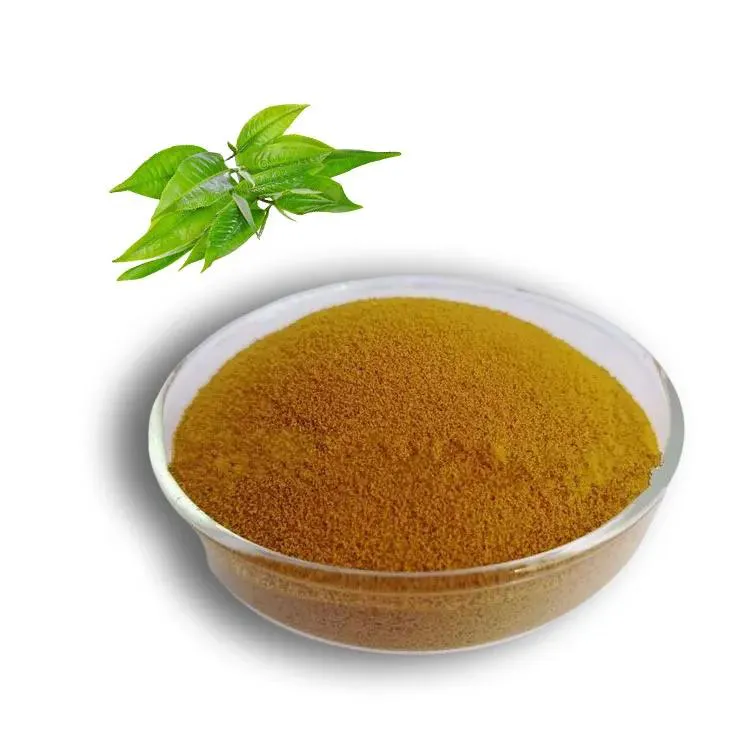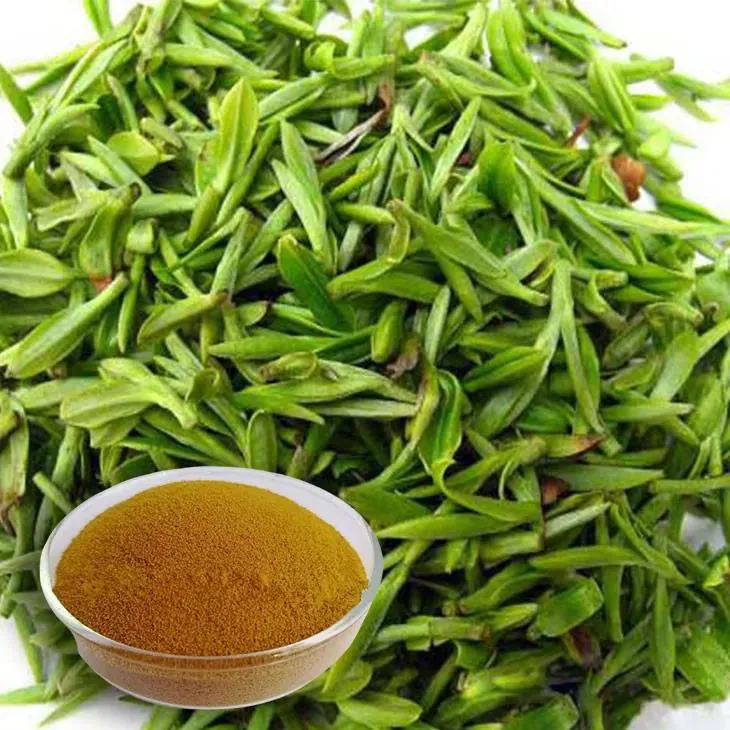- 0086-571-85302990
- sales@greenskybio.com
Is green tea extract better than coffee?
2025-06-26

In the realm of health and wellness, debates over the benefits and drawbacks of different dietary supplements and beverages are common. Two popular contenders often compared are Green Tea Extract and coffee, both celebrated for their energizing effects and potential health benefits. While both contain compounds that can boost energy levels and support overall health, they offer distinct benefits and cater to different health goals. This article delves into the advantages and disadvantages of Green Tea Extract versus coffee to determine which might be better suited for various health and lifestyle needs.
Understanding Green Tea Extract
Green tea extract is derived from the leaves of the Camellia sinensis plant and is a concentrated form of green tea. It contains a powerful mix of antioxidants called catechins, the most notable being epigallocatechin gallate (EGCG). These compounds are known for their health benefits, including improved brain function, fat loss, a lower risk of heart disease, and anti-cancer properties.
One of the main reasons people turn to green tea extract is its ability to aid in weight management. The catechins, particularly EGCG, can enhance metabolic rate and increase fat oxidation, making it a popular choice for those looking to support weight loss efforts. Additionally, green tea extract contains a small amount of caffeine, which contributes to its energy-boosting effects without the jittery side effects often associated with high caffeine intake.

Health Benefits of Green Tea Extract
Antioxidant Powerhouse: The high concentration of antioxidants in green tea extract helps combat oxidative stress, which can lead to cellular damage and various chronic diseases. This antioxidant effect can support overall health and longevity.
Metabolic Boost: Studies have shown that green tea extract can enhance metabolism and promote fat oxidation, making it a favored supplement among those seeking to lose weight or maintain a healthy weight.
Improved Brain Function: Green tea extract can improve brain function due to its caffeine content combined with the amino acid L-theanine. This unique combination enhances cognitive performance, providing a more stable energy boost than coffee.
Heart Health: The catechins in green tea extract are associated with improved cardiovascular health, as they can reduce cholesterol levels and improve blood flow.
Anti-cancer Properties: Some studies suggest that the antioxidants in green tea extract may offer protective effects against certain types of cancers, although more research is needed in this area.

Understanding Coffee
Coffee, brewed from roasted coffee beans, is one of the most popular beverages worldwide. Renowned for its high caffeine content, coffee is celebrated for its ability to enhance mental alertness, concentration, and overall energy levels. Coffee also contains a range of beneficial compounds, including antioxidants and other bioactive substances that can support various aspects of health.

Health Benefits of Coffee
Cognitive Enhancement: The caffeine in coffee is a well-known stimulant that boosts brain function, improving mood, memory, and reaction times. It is particularly favored for its ability to enhance mental alertness.
Physical Performance: Coffee can improve physical performance by increasing adrenaline levels and breaking down body fat, making free fatty acids available as an energy source. This makes it a popular pre-workout beverage.
Rich in Antioxidants: Coffee is one of the richest sources of antioxidants in the Western diet, which can help protect cells from oxidative damage.
Lowered Risk of Certain Diseases: Regular coffee consumption has been linked to a reduced risk of several diseases, including type 2 diabetes, Alzheimer’s disease, and certain types of cancer.
Mood and Mental Health: Coffee consumption is associated with a reduced risk of depression and may improve overall mental health and well-being.
Green Tea Extract vs. Coffee: Comparing the Two
Caffeine Content: Coffee contains significantly more caffeine than green tea extract, offering a more potent energy boost. However, this can also lead to jitters and increased heart rate in sensitive individuals. Green tea extract provides a gentler energy lift with added calming effects from L-theanine.
Weight Loss: Both green tea extract and coffee can contribute to weight loss by boosting metabolism. However, green tea extract is often preferred in supplements specifically marketed for weight loss due to the additional fat-burning effects of EGCG.
Antioxidant Properties: While both beverages are rich in antioxidants, green tea extract has a higher concentration of catechins, which are particularly beneficial for reducing inflammation and supporting cardiovascular health.
Effect on Mental Alertness and Mood: Coffee is well-recognized for its ability to improve mental alertness and elevate mood quickly. Green tea extract provides this benefit as well but may be more suitable for those who prefer a milder increase in cognitive function without experiencing jitteriness.
Potential Health Benefits: Both options offer a range of health benefits, from reducing the risk of chronic diseases to improving mood and mental health. The choice between the two may depend on individual health goals and tolerance to caffeine.
Conclusion
While both green tea extract and coffee offer significant health benefits, the decision between the two depends on personal preferences and specific health goals. If seeking a potent caffeine boost and increased mental alertness, coffee might be the better choice. For those looking for a milder energy uplift with added benefits in weight management and antioxidant content, green tea extract could be more advantageous.
Ultimately, incorporating one or both into a balanced diet can contribute positively to overall health provided the consumption is within moderate limits. As with any supplement or dietary change, it is recommended to consult with a healthcare professional, especially for those with underlying health conditions or sensitivities to caffeine.
- ▶ Hesperidin
- ▶ Citrus Bioflavonoids
- ▶ Plant Extract
- ▶ lycopene
- ▶ Diosmin
- ▶ Grape seed extract
- ▶ Sea buckthorn Juice Powder
- ▶ Fruit Juice Powder
- ▶ Hops Extract
- ▶ Artichoke Extract
- ▶ Mushroom extract
- ▶ Astaxanthin
- ▶ Green Tea Extract
- ▶ Curcumin
- ▶ Horse Chestnut Extract
- ▶ Other Product
- ▶ Boswellia Serrata Extract
- ▶ Resveratrol
- ▶ Marigold Extract
- ▶ Grape Leaf Extract
- ▶ New Product
- ▶ Aminolevulinic acid
- ▶ Cranberry Extract
- ▶ Red Yeast Rice
- ▶ Red Wine Extract
-
Lotus leaf extract
2025-06-26
-
Phyllanthus Emblica Extract
2025-06-26
-
Hedyotis Diffusa Extract
2025-06-26
-
Camu Camu Extract
2025-06-26
-
Ginger Extract
2025-06-26
-
Bitter Melon Extract
2025-06-26
-
Hops Extract
2025-06-26
-
Carrageenan Extract Powder
2025-06-26
-
Golden Seal Extract
2025-06-26
-
Tormentil Extract
2025-06-26





















